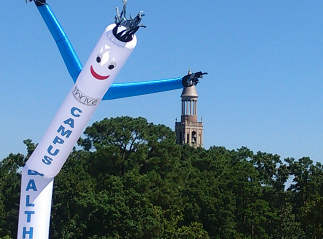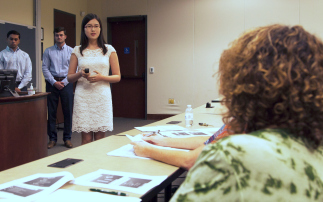News & Stories
Undergrads solve real-world issues for firms
Business students typically try to get real-world experience before they graduate – but the real world comes into Sharon Cannon’s Management and Corporate Communication classroom.
Cannon helps students develop effective business communication and teamwork skills in the required undergraduate business course. On the first day of class, she forms teams of four to five students and assigns a company issue for each of them to address.
But these projects aren’t hypothetical. Companies bring real-world issues for students to address – and often implement the students’ recommendations.
Last fall Cannon’s class studied how to improve The Hershey Company’s recruiting at UNC. One student team recommended that the firm create a brand ambassador position on campus – an idea that will be a reality with Hershey piloting the position at UNC.
 The talents of Cannon’s students have benefited the University, too. They have worked on many projects for UNC Campus Health Services, which recently installed an air dancer to help students distinguish its building from other surrounding medical buildings – a recommendation from a student team.
The talents of Cannon’s students have benefited the University, too. They have worked on many projects for UNC Campus Health Services, which recently installed an air dancer to help students distinguish its building from other surrounding medical buildings – a recommendation from a student team.
This fall three companies partnered with Cannon’s classes.
- Hershey asked students to recommend how to train the food service sales force – which works with restaurants to sell Hershey products and incorporate them into their recipes – in an impactful, disruptive format that is memorable yet concise.
- Customer acquisition marketing firm Red Ventures sought advice on going to market with a new chat platform.
- Bronto Software – founded by Joe Colopy (MBA ’99) and Chaz Felix (MBA ’01) – asked for recommendations on creating a diversity program aimed at recruiting more women and minorities to its engineering team.
Representatives from each company spent six weeks working with the student teams. Students researched their assigned company, learned to communicate and collaborate with clients and developed recommendations.
With four teams of students paired with each company, Cannon said the project infused a challenging and competitive edge into the class, motivating everyone to work harder. It also showcased the School’s commitment to developing students’ communication skills through real-life learning.
“Students tell me that they work harder on this project because it is real,” Cannon said. “You don’t want to disappoint someone at a company like Hershey.”
 Students appreciated the opportunity to gain internship-like experience during the semester – and if the companies incorporate their recommendations, students will have something tangible to share during job interviews.
Students appreciated the opportunity to gain internship-like experience during the semester – and if the companies incorporate their recommendations, students will have something tangible to share during job interviews.
In return, the projects gave companies an opportunity to build their brands on campus while benefiting from having the brainpower of 20-or-so extra minds focused on projects that they hope to implement. It also provided companies a valuable opportunity to gain insights from the highly coveted millennial demographic.
“As far as understanding where they’re coming from, we haven’t been in college for a while and haven’t been thinking about their perspective,” says Bronto HR director Georgia Grant.
Grant and her colleague, senior recruiter Melissa Crosby outlined their goals for a new diversity program. They asked two of their student teams to focus on how Bronto could diversify the entry-level recruitment of engineers and asked the other two teams to research the recruitment of experienced engineers.
The teams visited Bronto’s Durham campus to learn about the firm’s culture and then brainstormed realistic and effective recruitment tactics that the company could use.
At the end of the project, the teams made formal presentations to Bronto and submitted written proposals of their ideas – another real-life learning opportunity. “When you’re presenting to a real client, you need to make sure that you project a clear message,” said Alex Arditti (BSBA ’16). “Just learning how to make an appropriate slide deck, put together a proposal and present as a team has been a big takeaway,” agreed Russell Davis (BSBA ’16).
And the presentations – packed with valuable information and recommendations – were well-received by the client. “All of these presentations quickly made us realize that we have some gaps in our social media,” Crosby said, referring to student suggestions to revamp the company’s Facebook page and use Pinterest to connect with more women.
Each presentation provided valuable new information that the company will use, Grant said. “It’s been wonderful, and we definitely would do it again.”